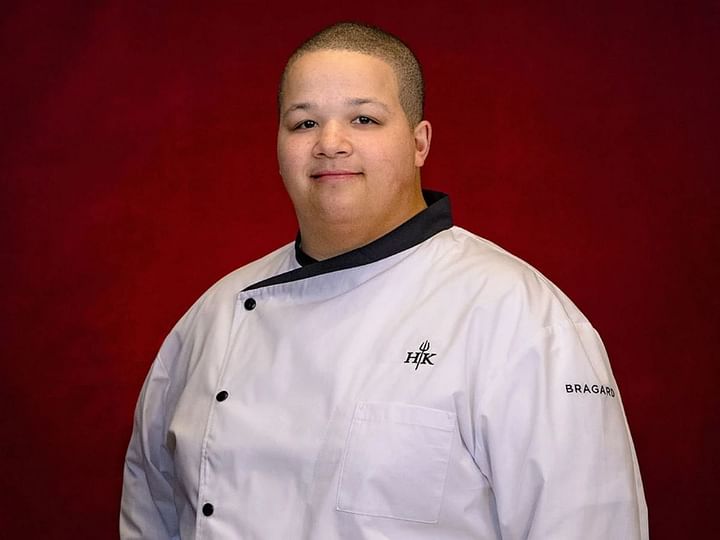Is Kyle From Hell's Kitchen Trans? Facts & Info
Is Kyle from Hell's Kitchen transgender? The question has sparked a flurry of online speculation and debate, primarily fueled by the reality television show's inherent focus on personal narratives and the audience's inherent curiosity about the lives of its contestants.
Navigating the complexities of identity in the public eye is a delicate process, and assumptions, particularly those based on fleeting moments on television, can easily lead to misinterpretations and unfair characterizations. While the query itself might seem straightforward, the answer is far from it, hinging on a constellation of factors including Kyle's own personal disclosure, his comfort with public perception, and the potentially intrusive nature of such inquiries. The reality show format, with its carefully constructed narratives and emphasis on dramatic moments, often obscures the nuances of individuals' lives. The pressures of being on camera, the editing process, and the desire to create compelling television can all contribute to an incomplete and sometimes misleading portrayal of a person's true self. Viewers are often left piecing together fragments of information, leading to speculation and conjecture, particularly concerning sensitive personal details like gender identity.
It is essential to recognize that the most definitive answer to this question resides solely with Kyle himself. Any attempt to definitively label or categorize him without his explicit declaration is a disservice to his privacy and autonomy. Conjecture should always be tempered with respect for individual self-identification, and the right to share such information on one's own terms. The media's role in this context should be to facilitate accurate and respectful reporting, and to avoid perpetuating misinformation or contributing to harmful stereotypes. The audience, too, has a responsibility to approach discussions with sensitivity and an understanding of the complexities surrounding gender identity. The quest for clarity does not justify intruding upon someone's personal life or engaging in gossiping that can cause damage.
In the absence of direct confirmation from Kyle, online discussions have yielded little conclusive information. The emphasis has been on interpreting subtle cues, analyzing social media posts, and comparing his appearance across various seasons of Hell's Kitchen, the results of which are largely anecdotal. The lack of definitive information underscores the importance of respecting an individual's privacy and avoiding drawing firm conclusions based on flimsy evidence. It is important to remember that appearances and personal presentations can often be diverse. The idea that a person's gender identity can be reliably deduced from external characteristics is dangerous and often inaccurate. Every individual has the right to define themselves, and the burden of clarity rests with the individual, not the public.
The debate surrounding Kyle's identity also touches on larger issues of representation and visibility within the media. Reality television, while providing a platform for a variety of personalities, is not always equipped to deal with nuanced portrayals of gender identity. The focus on conflict and drama often overshadows the importance of understanding and sensitivity. A thoughtful and accurate representation of the transgender community is vital to help promote empathy and education. When viewers, and even contestants on the show, are not properly educated, it can lead to a cycle of misrepresentation, prejudice, and stigma. The lack of informed awareness creates significant challenges in achieving genuine progress.
The impact of the entertainment industry on individual lives should not be underestimated. Individuals must decide how they choose to share their personal details in a public forum and have to have the choice to do so, while also being protected by certain safety nets. The pressures associated with fame and visibility are very real, and this can lead to severe anxiety. The relentless scrutiny can contribute to stress, depression, and a constant feeling of being misunderstood. Protecting one's privacy, however, can be challenging, because it requires careful navigation, legal action, and public statements. In the case of Kyle from Hell's Kitchen, the situation highlights the difficult balancing act. He is required to stay true to himself, to protect himself from unwarranted intrusion, and to interact safely with the audience.
Ultimately, the most responsible stance on the question of Kyle's gender identity is one of respectful uncertainty. Without his explicit confirmation, any definitive statement would be speculative at best. The focus should be on promoting empathy, respecting individual privacy, and acknowledging the complexities of human identity. The conversation should shift from the mere curiosity about Kyle, towards a broader consideration of how the media represents and engages with questions of gender identity.
| Bio Data | Details |
|---|---|
| Name: | Kyle (From Hell's Kitchen - name is not fully available) |
| Known For: | Appearance on "Hell's Kitchen" |
| Gender Identity: | Unconfirmed (Based on public information and lack of explicit self-identification) |
| Date of Birth: | Information Not Publicly Available |
| Place of Birth: | Information Not Publicly Available |
| Nationality: | Information Not Publicly Available |
| Marital Status: | Information Not Publicly Available |
| Personal Life: | Private, limited public information |
| Social Media: | Information Not Publicly Available. Note: If known, should be provided in a separate field and linked to. |
| Career: | Chef (Specific career details from Hell's Kitchen are available, but not a comprehensive career overview without more information) |
| Professional Highlights: | Appearing on "Hell's Kitchen" |
| Education: | Information Not Publicly Available |
| Awards and Accolades: | Information Not Publicly Available |
| Reference: | Hell's Kitchen Official Website |
The public's perception of individuals on reality television shows is very often shaped by editing and the need for ratings. The producers and editors have an impact on the storyline and the representation of the contestants. This can significantly alter the audience's view of any individual. This influence can be difficult to overcome when dealing with sensitive matters like gender identity. It is important for the viewers to keep in mind that they are watching a carefully constructed television product and that there is an entire production team contributing to what is presented on the screen.
The potential for misrepresentation extends beyond the show itself. The prevalence of social media and the rapid spread of online information allow for speculation to spread quickly and broadly, often without regard to the truth or accuracy. Rumors can gain momentum, fueling public discourse that can be harmful and unfair. The echo chambers of social media also allow for confirmation bias, where individuals encounter information that reinforces their initial assumptions. This can distort reality and create negative consequences for the person who is the subject of the rumor.
Ethical considerations are important, and are necessary when discussing an individual's gender identity. A person's choice of how and when to reveal their gender identity is the most crucial aspect of such discussions. The media should prioritize respecting an individual's privacy and autonomy. When questions about someone's identity arise, the responsible approach is to refrain from speculation. It is far better to allow people to define themselves than to assume and create judgments based on limited or inaccurate information. The ethical considerations are about respect, accuracy, and a commitment to protecting individuals' rights.
The absence of certainty should always be balanced with an acknowledgement of the value and worth of every individual. This is how respect and understanding begins. Every person is unique, and they have inherent worth, regardless of their gender identity or how they present themselves. This is especially true in a world where stereotypes persist, and the challenges of navigating society are constant. Treating each person with respect is important. The way someone chooses to identify is a basic human right.
The future of public discourse surrounding gender identity must be informed by education and sensitivity. Schools, media outlets, and communities have the responsibility to educate individuals about the diverse range of gender identities. This is best accomplished with clear information, including the use of appropriate terminology, and a clear understanding of the complexities of gender identity. The more people are informed and given access to reliable information, the better equipped they will be to approach conversations with respect. Media literacy, the ability to critically assess media content and separate fact from fiction, is a key skill in protecting individuals from harmful stereotypes and prejudice.
Additionally, greater visibility of transgender and gender non-conforming people within the media is necessary. Their presence in diverse roles, not just those defined by their gender, will contribute to normalizing and creating a sense of belonging. By sharing real stories, media can counter outdated ideas, and give the transgender and gender non-conforming community a chance to thrive. The result will be a society that is more accepting and understanding. The goal is to create an environment where people can define themselves without fear of judgment or discrimination.
The need for open and informed dialogue is undeniable. Honest conversations, though at times uncomfortable, are necessary to dismantle the negative stereotypes that undermine the lives of many people. Creating a safe space for conversation where respect and understanding are paramount is important. Discussions should focus on understanding individual experiences and challenging the assumptions that fuel prejudice. The media, public figures, and all community members have a responsibility to create a culture of respect and understanding. The benefits of having open conversation are immense, including the empowerment of individuals to live authentically and to help create a more inclusive and accepting world.
The responsibility for fostering a more inclusive and respectful environment is not solely with the media or public figures. It rests on each individual. Every person should challenge their own biases and make an effort to learn about gender identity and its impact on society. Taking the initiative to educate themselves is essential. This includes engaging in thoughtful dialogue, supporting the voices of those who are often marginalized, and always leading with respect. By actively working toward a more inclusive world, everyone can create a society where individuals are valued for who they are.
In conclusion, while the question of whether Kyle from Hell's Kitchen is transgender remains unanswered publicly, it is necessary to recognize the boundaries of public inquiry. The focus should be on the importance of respecting privacy, supporting individual autonomy, and promoting thoughtful dialogue about gender identity. This approach demonstrates empathy and creates an environment that is more inclusive for all people.


